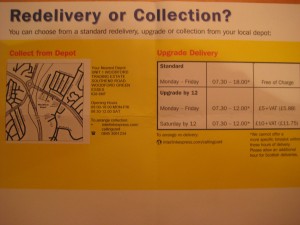Why do Royal Mail and online retailers conspire to hide information from me?
In June – August 1992 I posted 111 personal items of correspondence. Just over one a day to, amongst others, competitions (New Statesman: 4, Lucozade: 1), newspaper letter pages (Guardian: 1, Yorkshire Evening Press: 4), Locoscript Software (1), Michael Portillo (1), Liberal Democrat News (1), Conservative Central Office (1),* the Sergeant at Arms (1), the Post Office (3), the Iranian Government (8) and various friends (34).
In other words, I used to write quite a lot. And count quite a lot. Now though I hardly ever post an item.
Instinctively therefore I have some sympathy with the Royal Mail management’s line that it is having to face up to a much tougher and very different future.
However, whilst there has been a long-term fall in my use of the Royal Mail, in the last few years I’ve actually started using it more. Not because my sending is picking up, but because my online commerce has increased. As a result I’m increasingly paying firms – directly or indirectly – to post me parcels.
 More and more of those are being sent by courier rather than Royal Mail. But when it comes to customer service, the non-Royal Mail options frequently are dreadful.
More and more of those are being sent by courier rather than Royal Mail. But when it comes to customer service, the non-Royal Mail options frequently are dreadful.
Take a recent package sent to me via Interlink Express. The deliver options were (a) trek over to a non-weekend public transport friendly location in Essex to pick it up, (b) stay in all day (7:30am – 18:00pm because, no, they can’t specify a smaller delivery window – though at least I’m not in Scotland where it might come up to 19:00pm), (c) pay extra and only have to stay in half the day, (d) give up and not get the parcel.
In other words, Interlink Express’s options for a domestic customer are dire. For others – such as households where someone is in all day, or people in rural areas a long way from a Royal Mail sorting office – the comparison may be less favourable to Royal Mail.
But for a large chunk of the population, having the convenience of being able to go to the nearby Royal Mail sorting office at a moderately sensible hour, without having to take time off work or pay over more money, should be a major advantage over other couriers. As online commerce continues to grow that should also be a growing market for Royal Mail to prosper in.
And yet, I don’t see the Royal Mail making much of this. Nor – more importantly – do I see them encouraging their existing customers to make much of it either, such as by providing a “Delivered via Royal Mail” logo that online retailers could use.
Given the choice, I’d certainly shop online with a Royal Mail using firm than another. If between them they keep it secret that they use Royal Mail, that’s their loss. And it’s darn hard to find a retailer that even in tiny print admits during the buying process to using Royal Mail.
It’s all rather rum: here is a reason for me to shop with them rather than a rival, but neither they nor Royal Mail seem to want me to know.
* No, I don’t know what it was about.
absolutely – for me Royal Mail is always the best, if not perfect. see previous rant here: http://mattdaviesharingey.blogspot.com/2008/10/home-non-delivery-network.html
I wish Amazon had a ‘veto’ option, have had problems since too.
Hear hear. Also .. sometimes with Royal Mail*/Parcelforce** parcels you get the option of your local Post Office (*cost, **not cost, as I recall) when the first delivery fails or (in one or the other case) by default.
But they would rather close Post Offices than let them take parcels from anyone other than Parcelforce; a service for which I would happily pay a monthly retainer to my local Post Office.
But that would be to embrace the internet age and find a business model that works in a email dominated world.
Locoscript Software
Now there’s a blast from the past! Surely you don’t have one of Alan Sugar’s green-screened PCW monsters kicking around still?
You should buy elsewhere. In my non Lib Dem job we offer timed interlink. Well before noon or 3pm.
Totally agree. The Royal Mail are by far the best of a very poor bunch of delivery companies in the UK.
Also on your side about usage – I reckon I’ve never received more items by post than I do now. It makes me hugely unconvinced that there’s actually been a net reduction in postal traffic caused by the Internet.
I can’t see why there isn’t more demand for a delivery company that does it right though. I mean, how hard could it be to have an online system to tell me how far away my stuff is right now? Maybe text me when it’s 30 minutes away, even. All the vans have GPS, and they must know the route in advance, so it can’t be that tough. Maybe when I’m out, they could phone me and ask if it’s OK to leave it somewhere. If someone could do those things (and didn’t, say, deliver my items to neighbours without leaving a card or even indicating they were coming), I’d buy from shops which used that company.
Matt: that’s a good point. It’s rather a puzzle that not even the new entrants to the parcel business seem to be going for technology-driven options that deliver better customer service in the way that new entrants to a host of other businesses have done.